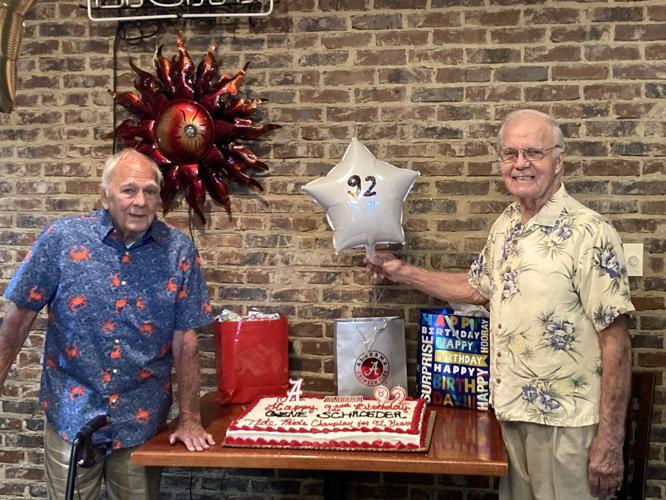Scattered amongst the numerous occupations Franklin “Slim” Schroeder has held in his 86 years of life is a stint as a Baptist minister.
Since that time, whenever the Schroeders hold one of their gargantuan family gatherings, Slim often leads prayers before meals.
As such, the Schroeders have added an extra book to their bibles. One is titled “The Book of Slim.”
Chapter one, verse one reads, “Lord... you see what you got here.”
“Our generation, now we’ve got that next generation, and we want those cousins and those second cousins to see, don’t lose touch,” Marge Roate, Slim Schroeder’s niece, said. “These are your people. They bring you back.”
It’s the ideal pre-dinner dedication for a 123-member family that rose from poverty-laced circumstances to provide success for itself and other families like it, largely due to Slim and his older brother Gene Schroeder’s contributions, the last two alive from their generation.
It’s a genealogy that’s touched many lives in Wetumpka and Alabama in general, whether through football, Gene’s 33 years serving poor families in the Community Action Program or Slim’s time as a Baptist minister in Dothan. Mayor Jerry Willis stated as much in a speech at Gene’s 92nd birthday celebration on May 15.
“The Schroeder family has meant so much to Wetumpka. Some of it we can talk about, some of it we can’t,” Willis said in his address, laughing. “You played a major role in the formation of Wetumpka.”

Andy Anders / The Herald Gene Schroeder, his niece Marge Roate and Wetumpka Mayor Jerry Willis at Schroeder's 92nd birthday celebration May 15.
The rock upon which the Schroeders built their clan was the late Virginia Schroeder.
Mother to the original nine Schroeder children, including Gene and Slim, her husband was often not in the picture.
Still, Gene and Slim never heard an unkind word from their mother about their father.
“I don’t even remember calling my daddy ‘daddy,’” Slim Schroeder said. “He had a girlfriend, I think, up in Birmingham. He left momma to raise all those kids. Especially the last four boys.
“She said, ‘Don’t blame him. I don’t know what it is, women just run after him. And he’s weak on that.’”
It required an unkillable spirit to raise nine siblings on a minimal income in the depression and post-depression era of United States history.
At one point the family grew so low on funds that Virginia couldn’t afford rent or a mortgage anywhere. They’d move from place to place in those days, only staying in one spot for as long as it took for the landlord or bank to evict for delinquent payments.
“She was a deeply faithful woman,” Roate said. “And she trusted, she would always use the scripture [Matthew 6:25-34]. ‘You don’t need to worry about anything. The Lord will take care of us.’ You’ve gotta trust that help is gonna come. But when that help comes, you’ve gotta turn around and help others.”
One path to success for the six Schroeder boys was football.
All were star players for Wetumpka High School in their time, four of them team captains. Nearly every year from 1935-55, there was a Schroeder who played for the Indians.
Gene captained the 1947 Wetumpka team to a 6-2-1 record, while Slim served the same role in 1953. Slim and Quentin “Shorty” Schroeder were such stars for the Indians that they landed scholarships to Alabama and Auburn, respectively. Wetumpka historians Butch Gantt, Mary Gantt and Edgar Welden referred to the Schroeders as the Indians’ “first family of football in their 2011 book “Wetumpka: The Golden Years.”
Even in those days, it was a family affair. In 1953, while Slim and Shorty Schroeder were playing with the Indians, their nephew Mike Murrell, then 8, served as the team’s mascot. He’d sport a jersey with Slim’s number on the front and Shorty’s number on the back.
Wetumpka went 9-0-1 that season. The one tie? It was the only game Murrell didn’t attend.
“More or less I just went out, did the exercises with them before the game,” Murrell said. “During the game, the coach would let me go in there with a towel.”

Submitted / The Herald The six Schroeder boys line up for a family game of football.
Another path was the military.
Gene Schroeder served four years in the U.S. Army out of high school, Slim served two in the National Guard and made “expert” on the rifle team while playing regimental football in Germany.
He returned to Alabama to resume college football shortly thereafter but the hard-nosed style of then-first-year head coach Paul “Bear” Bryant wore out his motivation for the sport.
“I thought he was gonna kill everybody out there. I had pledged to a fraternity and we were having a lot of parties — football was getting in the way. I thought, ‘Well I’ve played four years in high school and one in the Army, I’m tired.’ I told [Bryant] I wasn’t coming back out. I regret it now, but I didn’t know who Bear Bryant was then.”
Military service also put the family through one of its greatest hardships, however. Toby Schroeder, the family’s fourth boy, was killed accidentally while helping repair typhoon damage in Japan during the Korean War in 1951.
“We never knew exactly what happened,” Slim Schroeder said.
Gene had to leave college to recover his younger brother’s body from the morgue. He didn’t return.
That wasn’t the original plan, but he was hired full-time at General Electric and decided to stay out of school just as his roommate was arranging to bring him back. Gene spent five years with GE and four with RCA Electronics before finding the job he’d retire from 33 years later with one of Alabama’s first Organized Community Action Programs, or OCAPs.
In the wake of the Civil Rights Movement in 1964, the United States Government enacted the Economic Opportunity Act to combat poverty in the country. Community Action Programs were established across the states.
Gene was appointed the first executive director of the OCAP in Troy, Alabama serving Bullock, Coffee and Pike counties in 1967.
“We came from a very poor background. My job was to help bring people up. The EOA was designed primarily for low-income people. I began to work with people like that, got to build them houses, got them into head start, got them in job training.”
Gene took a $16,000 budget and grew it to over $7.5 million in funding by his retirement in August 2000. He expanded the OCAP’s footprint from three counties to seven. He distributed funds to a smattering of programs to help the poor including Low Income Housing, the Neighborhood Youth Corps, Family Planning, Head Start and the Emergency Food and Shelter Program. He went from managing three employees to over 200.
He ran the OCAP to such success that executive directors in his same position in other communities modeled their programs after his. His attention to detail made a difference.
“He was really a mentor to me to teach me some of the ropes about community action,” Jan Wood, former executive director for Wetumpka’s OCAP, said. “He was so personable. He didn’t just put it on the basis of some huge something, but he really said, ‘You can do this like this. This works for me in Troy, you can probably make this work for you in Wetumpka.’”
Slim Schroeder lifted others differently. His time as a minister in Dothan, Alabama started in 1978 after stints in finance and tire sales in Little Rock, Arkansas and Memphis, Tennessee.
After five years as the head of his church, one of his parishioners suffered a stroke. Slim would visit her in the hospital and at rehab, often encountering the same man there, who asked if he could come to a service at Slim’s place of worship. The man was black.
“I said, ‘Yeah, I don’t care, come on out there.’ So he did.”
While Gene Schroeder’s organization helped wrench open the jaws of job opportunity for African Americans, often offering to pay the first six weeks of salary to area companies who hired black employees, Slim’s parishioners weren’t all so open-minded.
After the man at the hospital attended two services and Slim had an African American family friend over for Thanksgiving dinner, a “For Sale” sign was posted on his church and adults would spout racial slurs about him to his children.
Poverty has a way of removing prejudice from one’s heart. One of the Schroeders’ closest friends growing up was a black man named York Stewart. He’d bring the family firewood, sometimes not even charging them. Stewart loved watching the Indians’ football games, even if security wouldn’t let him in the segregated stadium.
Gene Schroeder and his family members would see Stewart looking over the fence and wave to him, yell greetings to him. But they weren’t allowed to do so much as walk over and shake his hand.
“That was the law in those days, and we were following the law,” Gene said. “I wish I had done something. But we did nothing. What could we do, young guys like us? But that’s one thing momma taught us. She taught us not to do harm to anybody.”
Slim Schroeder felt that same helplessness seeing his parish, whose numbers had been growing since he took over, start losing members simply because he’d loved his neighbor regardless of their skin color.
He didn’t back off from his beliefs, even as parishioners pushed harder and harder for his removal. They put it to a vote. The younger church members were outraged at those gunning for Slim.
Slim resigned, the emotional stress on his family being too great. He returned to the automobile industry shortly thereafter.
“That’s what drove me out, those crazy folks in church didn’t want a black man coming in. I said, ‘I’ll tell you what, I’m not telling them not to come in here. If you want to do it, you have to be responsible for it. You have to tell the good lord that.’”
Today the Schroeder family treks through life with a combination of faith, love and laughter, Roate said.

Submitted / The Herald Gene Schroeder with his grandchildren.
The late Virginia Schroeder’s nine children had 21 grandchildren, who had 53 great-grandchildren who are up to 39 great-great-grandchildren.
They use occasions like Gene’s 92nd birthday party to corral as many as possible together. Even if they like to poke fun at times for football allegiances.
“We’ve been divided with Auburn-Alabama, we’ve been divided with the Schroeders and the Murrells,” Clay Murrell, Marge Roate and Mike Murrell’s brother, said. “But it’s always been fun. We’ve always enjoyed each other.”

Submitted / The Herald The Schroeder family tree as of May 17, 2021.
Roate was nearly moved to tears thinking about the ways her relatives have not just prospered in their lives after days dodging rent, but helped those around them prosper too.
“That has meant a lot to us as a family,” Roate said. “It’s never been about just us. That’s why you see the mayor and other people wanting to come to Gene’s party, because they feel like they were part of our family. They were part of benefitting because we loved this community.”







